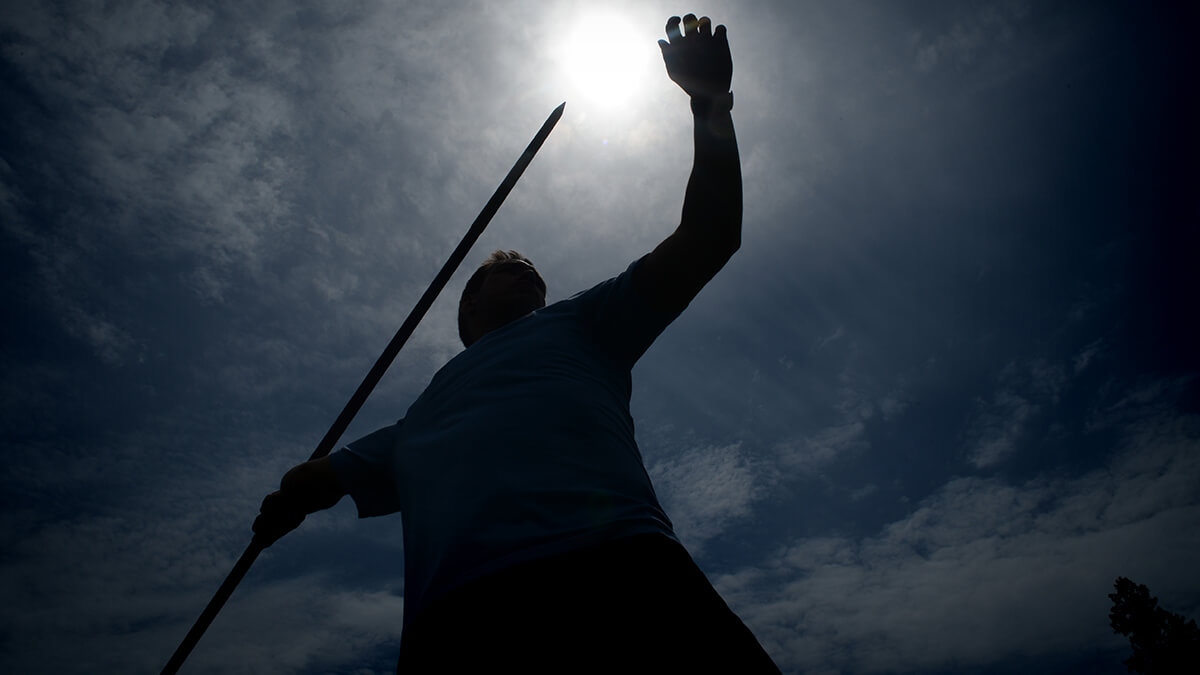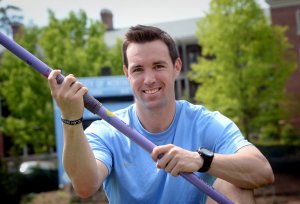Heart and desire
At 17, Houston Summers became the youngest American-born player ever drafted by the Arizona Diamondbacks. Now, Summers is a javelin thrower at UNC-Chapel Hill.

Coaches call it desire. Houston Summers refers to it more boldly as “my aggression.”
As a child, he saw everything as a challenge. “Whether it was wrestling, football, baseball, basketball, it was really, really fun for me to go out there and compete,” he said.
He needed that toughness to survive when in 2005, at age 17, he became the youngest American-born player ever drafted by the Arizona Diamondbacks.
At age 24, the year after he left baseball, he summoned that same spirit when he walked into the office of Carolina track and field Coach Harlis Meaders and announced his intention to try out for the team. As a sprinter, no less.
“We thought he was lost,” said assistant coach Josh Langley, who led Summers to Meaders’ office.
“Tell us about yourself,” Meaders said. When Summers said he had been a pitcher in the minor leagues, Meaders provided a glimmer of hope: “Hey, Coach Langley might be able to work with you on the javelin – he’s had some success converting baseball players.”
But Meaders also warned that most walk-ons who try out for the team don’t make it.
“Are you still sure you want to do this?” Meaders asked.
“Yeah, coach,” Summers answered.
Meaders had pushed just the right button.
A defining moment

Summers’ willingness to risk what was almost-certain failure had to do with a bigger test he had to face a few days after his 13th birthday.
It happened while he was sitting in a hospital bed in the children’s hospital at Wake Forest University.
He was dealing with a tumor the size of a baseball inside his nasal cavity that was pressing against his brain. Early on, it produced benign symptoms – headache and stuffy nose – that allowed doctors to mistake it for a bad cold.
Then his right eye began to blur and he lost hearing in his right ear. By the time an MRI revealed the tumor in his head, he could no longer taste his food or breathe through his nose. The tumor was not cancerous, but because of its location, it had become life threatening and had to come out.
“I remember, right before the operation, a surgeon coming into my room and handing me a sheet he needed to sign that listed all the risks,” Summers aid.
Stroke. Facial paralysis. Blindness. Death.
“I remember looking over at my parents and asking, ‘Don’t you guys need to sign this?’ And they said, ‘Oh, we already have.’”
That was when he realized that the responsibility for his life rested in his hands. And he reached for the pen.
‘The talk’
The operation not only saved his life, it gave Summers a new perspective about what he should do with it. “It gave me the sense that, if I could get through this, there is nothing I can’t do,” he said.
His parents were also instrumental in developing that spirit, Summers said.
“In middle school (in Greensboro), I was more interested in breaking the county home run record than I was making good grades,” Summers said.
That changed the summer before high school when his father sat his down for “the talk.”
Summers remembers, “He said, ‘Son, if you work extremely hard for the next 10 years of your life, you can have it made.’”
Not long after that, Summers began imagining the possibility of playing major league baseball and then going to college and medical school to become an orthopedic surgeon.
“My mother is a nurse and my father is a mechanical engineer, and I looked at becoming an orthopedic surgeon as marrying those two things together,” Summers said.
It would also be a way to stay connected with baseball.
“When the body breaks, somebody has to be there to fix it,” Summers said. “The reason I wanted to be a doctor was to be able to fix people, so to speak, so that they could continue to pursue their dreams.”
Making The Show
Summers got his first professional hit the day before he turned 18. He thought he was on his way to the major leagues.
Instead, he went from being a star catcher on the playing fields of Greensboro to going through a 1-for-45 hitting slump in ballparks where he still had to suit up every day and try to break out of it.
“Quite honestly, it serves as great training for other areas of life where you have to deal with setbacks and still stay focused on the big picture,” Summers said.
He became a utility man who ended up playing every position except first base. In the end, he became a pitcher and learned how to throw a knuckleball – a pitch thrown to change direction, even corkscrew, as it crosses the plate.
He bumped from A Ball to Double-A, then to Triple-A with the same unpredictability of the knuckleball, but never made it to The Show. After six years, he had had enough.
“I wanted something with a little more security,” Summers said. “And in the back of my mind, I always knew I wanted to be a doctor.”
Beating the odds
Summers was impossible to miss on the first day of practice when he showed up in the pack of Carolina walk-ons, and then surpassed them all.
“We had guys who were All-Americans in some sprinting events, and Houston was out in front, pushing the pace, leading,” Langley said. “You could see his engines were revved up a little bit higher than everybody else’s.
“About the fourth day, Coach Meaders stopped him and said, ‘OK, leave the tryout group. You are over here with everybody else.'”
Afterward, Meaders pulled Langley aside and whispered, “I don’t know if this kid is any good, but he’s got the heart, he’s got the desire. We are going to find something.”
The first time Summers tried the javelin throw, though, the tip of the javelin hit the ground, spun him around and hit him in the back of the head.
During his first event at the Kent Taylor Invitational in 2013, Summers threw the javelin 65.29 meters, which at the time ranked as a top-30 throw in the country.
His personal best, at the Virginia Challenge, was 67.97 meters, which qualified him for the NCAA East Preliminary.
At the start of his sophomore year last fall, Summers took on another challenge when he was accepted into the Honors Program.
“I want to be with the best and brightest and see how I square up,” he said. “It has really forced me, in the classroom, to kind of step out on the ledge and not stay seated in my happy, comfortable place.”
At times during his second season in the javelin throw, he felt out on the ledge as well.
Coming into this season, Summers said, he expected to be throwing 70 meters, but struggled at around the 63-meter mark. A turning point happened after player and coach got into a shouting match during a practice in early April.
“I could tell he was getting frustrated and I made a suggestion to him. He got short with me and I got short back,” Langley said. “Before long, we were having it out in the middle of the field.”
Both walked away and cooled off, and by the end of practice, Langley watched as Summers made some of his best throws ever.
“To me, that demonstrated the composure of a 26-year-old who has been in some really tough situations on the pitching mound and knows how to handle adversity,” Langley said.
At the home meet that weekend, Summers’ first three throws were all season bests, with his highest on the third attempt, at 66.04 meters. A week later, when Carolina hosted the ACC Outdoor Track and Field Championships, he threw for second place.
Not bad for a guy who never picked up a javelin until two years ago, Meaders said.
Asked what might happen in Summers’ two remaining seasons, Meaders said, “I think he’s reached his max – he’s capped out.”
Then he broke into a grin, anticipating that next season Summers will once again prove him wrong.




